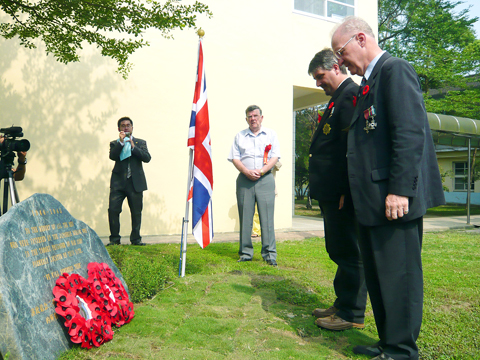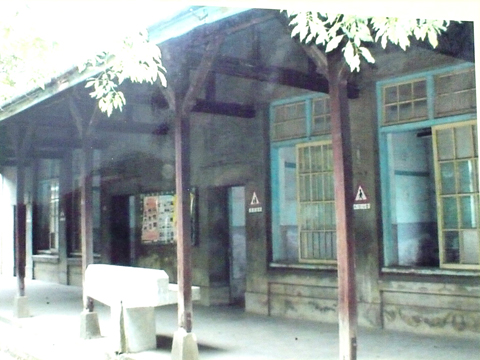Walking around the quiet, leafy campus of Gouba Elementary School in Douliou (斗六), Yunlin County, it is hard to imagine that the school was once used to house prisoners of war (POW) during World War II.
But from November 1944 until the end of the war, the school was home to the Toroku, or Douliou, POW Camp of the Imperial Japanese Army, or what POWs called “The Schoolhouse Camp.” Hundreds of US and British POWs were interned at the site before being moved to Shirakawa in Japan.

PHOTO: MO YAN-CHII
The location of the former camp was not confirmed until September 2000 when the Taiwan POW Camps Memorial Society visited the school in a bid to preserve the Japanese-style classrooms.
The original building, however, was torn down in 2003 out of safety concerns. The organization continued to communicate with the school, and was finally granted permission to erect a marble memorial at the site earlier this year.
“We should never forget the past. It’s not just a stone that we put up there, it’s what it meant for the POWs ... It is also an important piece of history for Taiwan and the local community,” said Michael Hurst, director of the organization.

PHOTO: MO YAN-CHIH, TAIPEI TIMES
Hurst traveled to the school with members and supporters of the organization on Saturday to commemorate the establishment of the memorial. At the ceremony, he told stories of the former POWs — who were too old to travel to Taiwan for the ceremony — to a group of school students and community members.
“All the surviving POWs are in their 80s or 90s, and it’s difficult for them to travel this far, and we don’t expect to see them coming back for memorials in the future,” Hurst said.
Although unable to be present at the memorial ceremony on Saturday, several POWs who had lived in the school camp shared their stories via e-mails.
“My work while I was there consisted of taking care of the vegetable garden plants ... we were always hungry and our thoughts were always of survival and getting back home,” US Army veteran Carl Pasurka said in an e-mail to the organization.
Raymond Harper of the US Navy said the POWs slept on cement floors in the classrooms and lived on rice and thin soup that only occasionally included vegetables.
Another POW, Alcide Benini of the US Army, described the Japanese commander in the school camp as a “pleasant man,” saying he had “probably the best Christmas as a POW” in 1944 because he helped lead church services.
Hurts said most of the POWs in the camp were in terrible physical condition, so they were not worked like slaves, as many were at the infamous “Hell Camp” in Kinkaseki, or Jinguashih (金瓜石), Taipei County. Some said they received good treatment in the camp during their imprisonment.
Gouba Elementary School principal Hsu Ching-hsuen (徐慶勳) said the school tore down the classrooms because of the lack of government subsidies for restoration work. However, he said the school valued what had happened on the school grounds and would pass on the history to its students.
Hsu said it was great to learn that local residents were friendly to the POWs, giving them sweet potatoes and cigarettes.
Still, the time in the school camp, as in the other 14 camps found in Taiwan, is an unbearable and dark memory for most POWs.
Although not a POW, Arthur Scholl, an 82-year-old US Navy veteran who now lives in Taipei, shared the pain of the POWs and the trauma the war has left them with.
“It’s only when I started to associate with the Taiwan POW Society that I was able to tell the stories in the wars,” he said.
Scholl talked in private about his experience fighting in World War II in the Philippines, in which he was almost killed on aircraft carrier, but was unable to speak at the ceremony because he was overcome with emotion.
The Japanese listed 4,344 POWs in Taiwan, with 15 POW camps. Except for the camp in Jinguashih, where some of the original structures remain, the other camps have been destroyed almost completely, Hurst said.
The recognition of the sites, however, will continue, he said.
The organization plans to hold a memorial ceremony at the remnants of the walls of Taipei Prison on Jinshan S Road on June 20 to commemorate the POWs who were executed in the old prison. It also plans to erect two more memorials at school camps in Yunlin County.
The stories of the POWs will be told even though the former POWs who spent part of their lives in Taiwan were unlikely to come to the island to tell their experiences in person.
“Our goal now is to bring their children and grandchildren here, and help them learn the past of their dads and granddad,” Hurst said.

‘DENIAL DEFENSE’: The US would increase its military presence with uncrewed ships, and submarines, while boosting defense in the Indo-Pacific, a Pete Hegseth memo said The US is reorienting its military strategy to focus primarily on deterring a potential Chinese invasion of Taiwan, a memo signed by US Secretary of Defense Pete Hegseth showed. The memo also called on Taiwan to increase its defense spending. The document, known as the “Interim National Defense Strategic Guidance,” was distributed this month and detailed the national defense plans of US President Donald Trump’s administration, an article in the Washington Post said on Saturday. It outlines how the US can prepare for a potential war with China and defend itself from threats in the “near abroad,” including Greenland and the Panama

A wild live dugong was found in Taiwan for the first time in 88 years, after it was accidentally caught by a fisher’s net on Tuesday in Yilan County’s Fenniaolin (粉鳥林). This is the first sighting of the species in Taiwan since 1937, having already been considered “extinct” in the country and considered as “vulnerable” by the International Union for Conservation of Nature. A fisher surnamed Chen (陳) went to Fenniaolin to collect the fish in his netting, but instead caught a 3m long, 500kg dugong. The fisher released the animal back into the wild, not realizing it was an endangered species at

The Chinese Nationalist Party (KMT) is maintaining close ties with Beijing, the Democratic Progressive Party (DPP) said yesterday, hours after a new round of Chinese military drills in the Taiwan Strait began. Political parties in a democracy have a responsibility to be loyal to the nation and defend its sovereignty, DPP spokesman Justin Wu (吳崢) told a news conference in Taipei. His comments came hours after Beijing announced via Chinese state media that the Chinese People’s Liberation Army’s Eastern Theater Command was holding large-scale drills simulating a multi-pronged attack on Taiwan. Contrary to the KMT’s claims that it is staunchly anti-communist, KMT Deputy

The High Prosecutors’ Office yesterday withdrew an appeal against the acquittal of a former bank manager 22 years after his death, marking Taiwan’s first instance of prosecutors rendering posthumous justice to a wrongfully convicted defendant. Chu Ching-en (諸慶恩) — formerly a manager at the Taipei branch of BNP Paribas — was in 1999 accused by Weng Mao-chung (翁茂鍾), then-president of Chia Her Industrial Co, of forging a request for a fixed deposit of US$10 million by I-Hwa Industrial Co, a subsidiary of Chia Her, which was used as collateral. Chu was ruled not guilty in the first trial, but was found guilty